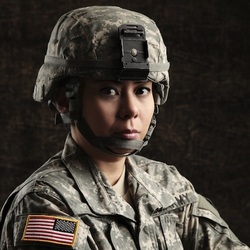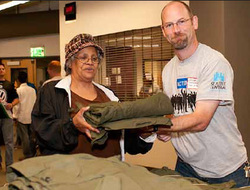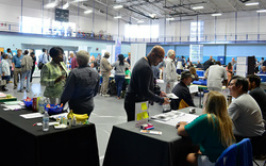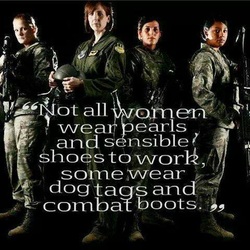|
Media
Thank you to multiple media sources, The Seattle Stand Down is continually getting more recognition and support within the greater Seattle - Puget Sound community. Here are just a few of the articles written about how and why The Seattle Stand Down supports and "gives a hand up" to our communities struggling veterans. If you would like more information about our organization or to do an interview, contact: Rebecca Murch, Executive Director, at rmurch@theseattlestanddown.org |
|

From Soldier to Civilian: Standing Up for Women Veterans
By Perry Firth, Graduate Student, Seattle University Community Counseling, and Project Assistant, Seattle University’s Project on Family Homelessness
Suppose someone asked you to picture a veteran.
What do you see?
If you are like most people, you visualize a man. Maybe this man is strong and fit- looking. Or maybe he has an old ‘Nam hat, and still wears a faded combat jacket.
You might even visualize somebody who is homeless and asking for money, their sign proclaiming that they are a veteran, and that they’ve fallen on hard times. Anything helps.
While many veterans are men, and some of these men struggle with homelessness, the unfortunate reality of this stereotype is that it ignores a growing segment of the homeless population: women veterans. More...
By Perry Firth, Graduate Student, Seattle University Community Counseling, and Project Assistant, Seattle University’s Project on Family Homelessness
Suppose someone asked you to picture a veteran.
What do you see?
If you are like most people, you visualize a man. Maybe this man is strong and fit- looking. Or maybe he has an old ‘Nam hat, and still wears a faded combat jacket.
You might even visualize somebody who is homeless and asking for money, their sign proclaiming that they are a veteran, and that they’ve fallen on hard times. Anything helps.
While many veterans are men, and some of these men struggle with homelessness, the unfortunate reality of this stereotype is that it ignores a growing segment of the homeless population: women veterans. More...

Seattle Stand Down returns to Capitol Hill to offer services to homeless veterans...
When veterans return home from war, they can end up feeling completely lost.
“They’re put out to pasture and they’re like ‘what do I do now?’” said Derek Mapes, who finished a stint in the Air Force in 2010.
Often facing PTSD and homelessness, many veterans have a difficult time navigating the myriad of services and benefits available to them, Mapes said.
“It’s like dealing with the DMV,” he said. “You’re always in the wrong department.” More...
When veterans return home from war, they can end up feeling completely lost.
“They’re put out to pasture and they’re like ‘what do I do now?’” said Derek Mapes, who finished a stint in the Air Force in 2010.
Often facing PTSD and homelessness, many veterans have a difficult time navigating the myriad of services and benefits available to them, Mapes said.
“It’s like dealing with the DMV,” he said. “You’re always in the wrong department.” More...

At-risk, homeless veterans supported with "hand up" approach
SEATTLE - The community did not give many Vietnam Veterans a warm reception when they came home, and some feel they have not been adequately taken care of for their service.
Rebecca Murch, Executive Director for The Seattle Stand Down, is a U.S. Navy veteran who served in the Persian Gulf.
"When I was making the transition between military and civilian life, I was not offered a lot of information on how to access the benefits I was entitled to as a veteran," Murch says. "When you're in the military you are taken care of 24/7 - everything is provided for you - housing, food, clothes, a dependable job and a paycheck, but once you're discharged you are sent back and on your own."
There are currently upwards of 800 homeless veterans in the King County area, and Seattle Stand Down wants to address the issue with a "hand up" to homeless veterans and those at risk of homelessness. More...
SEATTLE - The community did not give many Vietnam Veterans a warm reception when they came home, and some feel they have not been adequately taken care of for their service.
Rebecca Murch, Executive Director for The Seattle Stand Down, is a U.S. Navy veteran who served in the Persian Gulf.
"When I was making the transition between military and civilian life, I was not offered a lot of information on how to access the benefits I was entitled to as a veteran," Murch says. "When you're in the military you are taken care of 24/7 - everything is provided for you - housing, food, clothes, a dependable job and a paycheck, but once you're discharged you are sent back and on your own."
There are currently upwards of 800 homeless veterans in the King County area, and Seattle Stand Down wants to address the issue with a "hand up" to homeless veterans and those at risk of homelessness. More...

Women Are Vets, Too: Meet the Organization that Acts Like It
Women are the fastest-growing segment of the veteran population, according to the U.S. Department of Veterans Affairs, but they face unique barriers in life after active duty, including difficulty gaining access to veterans' services. That's partly because many women who have served in the military do not identify as veterans, according to Rebecca Murch, executive director of an annual veteran advocacy event called Seattle Stand Down.
Tables were piled high with free clothing, backpacks, and other essentials. Murch, who served in the Navy during the Gulf War, says there are several reasons why women may not think of themselves as veterans. Some think combat service is required for veteran status. "Others may be survivors of military sexual trauma, have been alienated by the system, and do not want to associate with anything military, even the V.A," Murch said in an email. More...
Women are the fastest-growing segment of the veteran population, according to the U.S. Department of Veterans Affairs, but they face unique barriers in life after active duty, including difficulty gaining access to veterans' services. That's partly because many women who have served in the military do not identify as veterans, according to Rebecca Murch, executive director of an annual veteran advocacy event called Seattle Stand Down.
Tables were piled high with free clothing, backpacks, and other essentials. Murch, who served in the Navy during the Gulf War, says there are several reasons why women may not think of themselves as veterans. Some think combat service is required for veteran status. "Others may be survivors of military sexual trauma, have been alienated by the system, and do not want to associate with anything military, even the V.A," Murch said in an email. More...